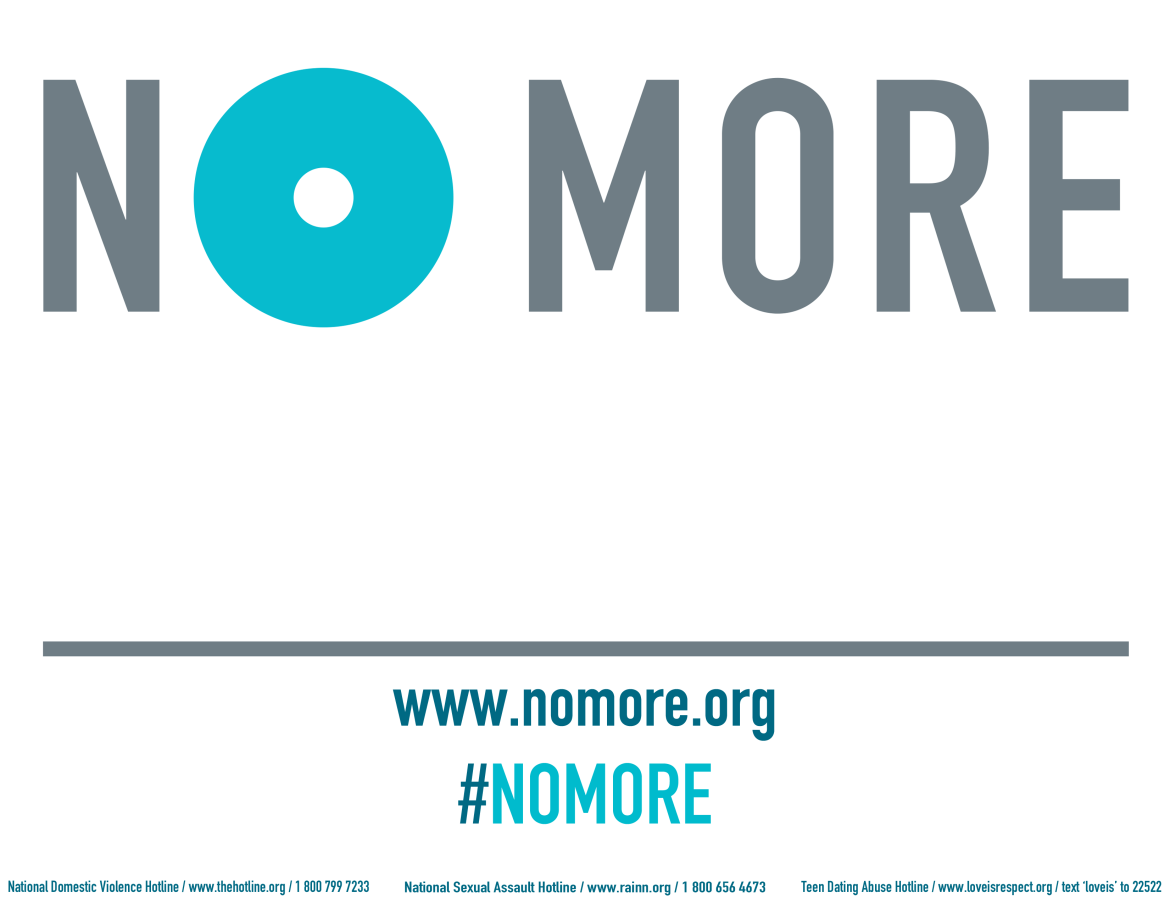
Why Doesn't She Leave?
In-between the bone-crushing tackles and beer ads at the Super Bowl this year, the NFL will air its first anti-domestic violence PSA. I want to take this opportunity to stress the severity of domestic violence and to educate. Please take a stand with me and say NO MORE to domestic violence!
Domestic violence is about one person in a relationship using intentional acts and a pattern of behaviors to control another person. Domestic violence is not limited to “certain groups.” It is something that transcends all socioeconomic, race, religion and sexual orientation barriers. It is something that happens to people who are married or not married; heterosexual, gay, or lesbian; living together, separated, or dating. In most cases, men abuse female victims, however, women can also be abusers and men can be victims It is difficult to predict who may be a batterer and who may be a victim of domestic violence. There are no typical characteristics or profiles of abusers or victims.
Many people who are being abused do not see themselves as victims and it is very rare that an abuser takes responsibility for their actions, rather they often blame the victim for causing the behavior. Abusers are not easy to spot. There is no 'typical' abuser. In public, they may appear friendly, charming, charismatic and loving to their partner and family. They often abuse only behind closed doors and try to hide the abuse by causing injuries that can be hidden and do not need a doctor Abusers have learned to abuse so that they can get what they want. The abuse may be physical, sexual, emotional, and psychological, not just physical violence, which is what people often associate with domestic abuse.
Abusers do not just abuse in one area, and their behaviors and control escalate during the course of a relationship. It is important to learn and know that domestic violence is not something that is obvious at the start of any relationship, but that it happens systematically and gradually during the course of the relationship. There are no clearly defined warning signs that would alert someone to the stages.
In the same way a river changing a boulder to a smooth rock with the constant water flowing over it to make subtle but lasting changes, domestic abusers push boundaries, wearing down a victims self esteem, behaving in public one way and in private as a way to disorient and isolate their partner, and creating a dependence on the abuser making it possible for them have control over the victim They are masters at keeping their victims in a relationship by manipulating their victim to believe they are penitent with words that seem sincere and temporary actions to support their apology.
This causes the victim to question their own judgement or memories of the behavior, minimize the past abuse, forgives the abuser and focus on the illusion that a relationship based on these hopes of meaningful and sustainable change is possible. An abuser gains control over a victim every successful time this happens, thus beginning another new round of abuse and furthering the cycle of abuse. Abuse is not an accident. It is not something that gets better with time.
Abusers commonly use one or more of the following to control their victims:
• Controls what you do, whom you see, and where you go
• Calls you names, puts you down, or humiliates you
• Makes you feel ashamed, isolated, wrong, stupid, scared, worthless, or crazy
• Acts jealous, accuses you unjustly of cheating, flirting, or having affairs, however, often having affairs and cheating themselves
• Threatens you or makes you feel afraid
• Punishes you by withholding affection
• Constantly criticizes you and/or your children
• Blames you for arguments or problems in the relationship
• Makes non-verbal gestures intended to intimidate you
• Isolates you from friends or family
• Makes you feel guilty for spending time with someone else
• Threatens to take the children from you
• Monitors your phone calls
• Continually tracks your whereabouts by cell phone, pager, text messaging or GPS system
• Causes problems for you at work or at school
• Continually harasses you at work either by telephone, text or e-mail
• Takes your money, withholds money, makes you ask for money, or makes you account for the money you spend. Spends large sums of money and refuses to tell you why or what the money was spent on
• Refuses to let you sleep at night
• Uses your immigration status or personal history against you
• Tells you that he cannot live without you and threatens suicide if you leave
• Throws or breaks objects, punches walls, kicks doors in your home during arguments
• Destroys your personal property or sentimental items
• Pushes, slaps, bites, kicks or chokes you
• Uses or threatens to use a weapon against you or your children
• Drives recklessly with you/and or your children in the car during an argument
• Threatens to hurt or hurts pets
• Forces or pressures you to have sex against your will. Prevents you from using birth control or from having safe sex. Makes you do things during sex that make you feel uncomfortable.
• Traps you in your home or keeps you from leaving
• Tells you that you will never belong to anyone else or that you will never be allowed to leave the relationship
• Prevents you from calling the police or seeking medical attention.
• Withholds your medication
Victims may seem passive or extremely frightened or they may be very angry about what is happening:
• The most obvious signs of domestic violence will be evidence of severe, recurring, or life-threatening abuse (broken bones, repeated bruises, threats with weapons, etc.)
• Domestic violence may also be emotional or psychological abuse where one partner continually degrades, criticizes, or belittles the other or accuses the other of being stupid, unattractive, unfaithful, a bad parent, etc.
• Many batterers use the legal system to punish their partners for taking steps to free themselves of the abuse.
• Batterers use issues arising from custody and visitation cases to try to re-establish control over their partners.
• Batterers frequently display extreme jealousy
• Batterers often discourage their victims from seeking help. People who have difficulty making or keeping appointments may be trying to avoid letting their abusers know they are seeking help.
• Batterers frequently insist on accompanying their victims to appointments even if they are not involved in the case. The batterer may refuse to leave the victim alone and may try to speak for the victim in order to control the information the victim shares.
• Batterers harass, stalk and keep tabs on their victims. If someone reports constant phone calls, text messaging, etc. at home or at work to keep track of their whereabouts, this could be a sign of domestic violence.
• Batterers try to isolate their victims from emotional support systems or sources of help.
Why doesn’t the person just leave if it is so bad?
• belief that the abusive partner will change because of his remorse and promises to stop battering
• fear of the abuser who threatens to kill the victim if abuse is reported to anyone
• lack of emotional support
• guilt over the failure of the relationship
• attachment to the partner
• fear of making major life changes
• feeling responsible for the abuse
• feeling helpless, hopeless and trapped
• belief that she is the only one who can help the abuser with his problems
• economic dependence on the abuser
• fear of physical harm to self or children
• fear of emotional damage to the children over the loss of a parent, even if that parent is abusive
• fear of losing custody of the children because the abuser threatens to take the children if victim tries to leave
• lack of job skills
• social isolation and lack of support because abuser is often the victim’s only support system
• lack of information or understanding of abuse
• belief that law enforcement will not take her seriously
• lack of alternative housing
• cultural or religious constraints
Divorce is not an easy thing for anyone, but it is extremely hard for someone in a domestic abuse situation for many reasons The next time, before you ask, why doesn’t she just leave, instead ask, why doesn’t he just change????

If you are in danger, call the U.S. National Domestic Violence Hotline at 1-800-799-7233 and TTY 1-800-787-3224. For recommendations on websites and online domestic abuse support groups please message me privately.









